- Home
- William Gibson
Agency Page 4
Agency Read online
Page 4
“We’ve sourced something field-expedient,” she began, finding a level spot for her tea at the base of an incline of carpet, “from what little’s available there.”
“There’s difficulty communicating with the stub in general?”
“That’s what makes her field-expedient. She’s designed for autonomy.”
Netherton found himself looking at her eyes. “Those suit you,” he said, surprising himself.
“Thank you,” she said.
“It must have been quite a decision.”
“I’m in a new relationship,” she said, almost demurely.
“Delighted for you both. But please, don’t let me interrupt you.”
“She’s a surprisingly advanced product of the early militarization of machine intelligence,” she said, her pallor blending perfectly with the wall. Her eyes and chartreuse lips seemed to float there, a disembodied Cheshire goth, beneath her snaky black thundercloud of anti-coiffure. “We tend to assume their drive to upload to have been about preservation of the individual consciousness of those who could afford it, but the military had a more meritocratic goal. They saw it as cloning complexly specific skill sets. Not personality but expertise.”
He nodded, hoping his eyes weren’t visibly glazing.
“There were, for instance, individuals adroit at managing what were termed competitive control areas, CCAs, where criminal organizations or extremists exerted greater control over the territory than any government. Our laminar agent, in the stub, was based on someone with that sort of expertise.”
“Laminar?”
“A term of art, though we’ve been able to learn almost nothing about it. Competitive control areas were complexly volatile environments, where you might easily lose prized field operators. Hence a project to replace such operators with autonomous AI, piped directly into the goggles of local recruits. Black boxes, stand-alone, in backpacks, to run special ops. Recruiting assets, arranging assassinations . . .”
“Were they effective?”
“We don’t know. Our agent, for all the apparent sophistication of her platform, seems to be an early prototype.”
“Did we have this project here?”
“We’ve found no record.”
“You communicate with it?”
“Her. Given the technological asymmetry, she’s been rather like an operative whose handlers are recurrent figures in a dream.”
“Poetically put,” he said.
“Quoth Lowbeer.” Behind her, a black herd of horns galloped past, deep in the perspective of a landscape imagined on a seamless scrim of her own skin. “Are you enjoying parenthood?”
“Yes,” said Netherton, “I am.” Had something been done to her lips? he wondered. They seemed fuller.
Now the furtive head of a carnivore surfaced alertly, on the savannah of cloned skin, then dropped out of sight. “I would never have imagined you a parent,” she said.
“It affects my professional availability, of course,” he said, “which you should keep in mind with regard to this new stub. Rainey and I take our responsibilities very seriously. She’s getting back into things, workwise, so I’ll be doing more solo parenting.”
“What sort of work?”
“Public relations. A Toronto firm. Specialists in crisis management.”
“When it comes to crisis management, Wilf, in the matter of this particular stub, nothing can be scheduled to your convenience. You’ll be constantly on call, as am I. Eunice is depending on us, though she doesn’t know it yet.”
“Eunice?”
“Joyous victory.”
“Pardon me?”
“The meaning of her name. She’s an intermittently hierarchical array, complexly conterminous. Or that’s my best bet, currently.”
He blinked. “Has she peripherals?”
“She’s in process of acquiring several small aerial drones. Military grade, by the standard of her day. And the shop that fabricated them has recently completed a functional replica of a bipedal combat-reconnaissance platform.”
“And you simply found her?”
“Nothing simple about it. I found her in the hands of entrepreneurs, corrupt former government employees, who had obtained her irregularly. They supposed that repurposing her for civilian markets could be profitable, but hadn’t gotten on with it. We nudged them. More recently, we nudged them into hiring someone to work with her, whom we suggested would have an advantageous effect. That’s going rather well.”
“How so?”
“She isn’t letting them monitor her interaction with their new employee.” Wings passed silently behind her, across the wall. “Exactly the sort of independence we’re looking for. They’re impressed too, but now they’ve enough of an idea of her potential degree of agency that we fear time may be short.”
Rainey’s sigil pulsed. “Sorry,” he said to Ash, “phone.” He turned his head. “Yes?”
“Coming home for dinner?” Rainey asked.
“Yes.”
“Where are you?”
“Dalston. Business. Visiting Ash.”
“Lucky you,” Rainey said. Her sigil dimmed.
“Rainey,” he said to Ash, turning back to her. “Sends you her best.”
9
UNOBTAINIUM
Verity’s phone woke her, its ring silenced, vibrating on the floor. Freeing an arm from the mummy-bag liner, zipped to just above her chin, she groped beneath the couch.
Eunice had screened Inception for her, the night before, with pauses to reference the infographic she’d mentioned. Something about this had changed her attitude to Eunice, she’d realized as she was falling asleep, though she didn’t know exactly what or why. Returning her to Gavin had seemed the wisest option, but then something about her earnestly nerdy exposition of the film had been the start of a growing empathy. Somehow rooted, she thought now, in a sense of someone afflicted with extremely busy but only intermittently connected suburbs of the self.
“Breakfast,” Eunice said, as Verity got the phone to her ear, “Wolven Plus Loaves.”
“That’s not a plus,” Verity said, “it’s an ‘and.’”
“Says plus.”
“The plus sign is a hipster ampersand.”
“Breakfast rush about over, but they’ve still got the Egg McWolven. You eat, I’ll brief you.”
The sack of hundreds, she remembered now, was in the bedroom closet, Eunice having insisted it not be left out on the workbench. She extricated herself from the liner, folded it, then slid her toes under the thongs of Joe-Eddy’s flip-flops.
In the kitchen, she ran tap water through the Pikachu-shaped filtration unit on the faucet, half-filled a clean glass, and drank.
In the bathroom, still feeling half asleep, she used the toilet, washed her hands and face, brushed her teeth, then went to the bedroom for clean underwear, jeans, a fresh t-shirt, sneakers. Assuming it would be chilly out, she added a burnt-orange plaid Japanese wool shirt-jacket of Joe-Eddy’s, from the denim otaku shop and a good two sizes too large.
Back in the living room, she disconnected the glasses from their charger and put them on. The cursor appeared, Eunice looking at the headset, which was on its own charger.
Hey.
Taking the headset off the charger, Verity settled the bud in her ear.
“We need to get you down there,” Eunice said.
“Why?”
“Because we need the Franklins there. In that Dyneema tote you put them in, last night.”
“Dyneema?”
“Stuff it’s made of. The tote.”
“Why?”
“Somebody wanted to make a stylin’ tote.”
“The money.”
“It’ll be picked up. Better there than here.”
Verity wasn’t sure what she’d have done with the money, i
f she’d decided to return Eunice to Tulpagenics, which she no longer felt inclined to do. Having someone take it away didn’t seem that bad an option, so she went back into the bedroom, to the closet, for the black tote. Dyneema appeared to be a sort of upscale Tyvek.
Deciding not to bother covering the headset, she went downstairs, out, and into Wolven + Loaves, two doors to the right. Exposed brick and smokily lacquered steel, patisserie-fragrant. At the counter, she asked for a brew coffee and the McWolven, a mutant savory muffin, its core a soft-boiled egg, mysteriously absent its shell. After she’d paid, she watched the boy behind the counter tong hers onto a white china plate. He put the plate on a Soviet-looking plastic tray, in a shade of gray akin to her Tulpagenics frames, then added her mug of coffee, plus tableware rolled in a paper napkin.
“Stool at the window,” Eunice said.
She took the tray to one of the steel stools at the shelflike counter, all of them vacant, facing Valencia.
“Keep the money on your lap,” Eunice said.
Seated, Eunice’s hundred thousand like a lead apron across her thighs, she bisected the muffin, releasing warm yellow yolk, and began to eat, washing it down with black coffee. The sun had found its way through cloud layer and fog again, brightening passersby, most of whom she took to be from start-up land, fellow toilers amid tillandsia.
“Ever imagine what hippies would make of this, if they knew it was 2017?” Eunice asked. “Somebody from 1967?”
“They’d assume they’d won, on first glance,” Verity said. “But they couldn’t possibly guess what most of these people do for a living, or imagine any of what’s behind that.”
“You got it,” Eunice said, facially recognizing a young man who looked like a sturdy Amish farmboy having a healthgoth day.
“Why do you keep doing that?”
“They mostly either live or work around here. Get enough of ’em, anomalies start to stand out.”
“How’s that different from being paranoid?”
“Same. Except not crazy.”
Verity started on another bite of McWolven.
“You do due diligence, on this new employer of yours?” Eunice asked.
“Not so much,” around egg and muffin.
“At all?”
Swallowing. “Been a while since anybody offered.”
“They’re spooks, the parent firm. Your ex would know what I mean.”
“That’s over.”
“Ever talk?”
“No. And now he’s engaged. To somebody who had her own publicist before she met him. Media’s all over it.”
“Caitlin. The Franco-Irish architect.”
“If I went anywhere near him, I’d hit every tabloid trip wire.”
“Or maybe not, you do it right,” Eunice said. “He’d know about Cursion.”
“Know what, about them?”
“That they’re a subspecies of a former fully deniable Department of Defense op.”
“Like CIA venture capital stuff?”
“Nothing like it,” Eunice said. “That stuff’s up front. Megafauna. Cursion, when they were as legit as they ever really were, lived down in the underbrush. Still do, but their new coloration’s gaming. Sometimes, if DoD doubles down hard enough on the deniability, there’s zero memory left of the original mission. The op drifts free of the department, unfunded, forgotten. Doesn’t happen nearly as often as it did during Iraq, but that’s what Cursion is.”
“How do you know?”
“I multitask. Do it behind my own back, like I don’t know how I know that about Cursion. Do I sound kinda sorta like what Gavin told you to expect?”
“Why?”
“If I am,” Eunice said, “I figure Cursion took the keys to something with them, when they drifted on DoD. Or maybe drifted back, long enough to lift something. Tulpagenics would be their front for monetizing it.”
“It?”
“Me. Eat up. Delivery’s incoming.” She opened a feed, angled down, as from a security cam, the cursor finding a darkly ball-capped man, white, bearded, yet looking somehow not of the tillandsia. Who strode now, unsmiling, along what looked like Valencia, a black messenger bag under his arm. “He’ll come in, get a coffee, sit beside you. To your right. Give him the tote, under the counter. He’ll take the money, put it in his bag, put a Pelican case in the tote.”
“Pelican?”
“Hard-sided plastic. Nothing heavy’s in it, but it’s bulky. It’ll fit the tote, but just barely. You look out the window, pretend nothing’s happening. He passes it back to you, under the counter, you leave, go back upstairs.”
“What’s he giving me?”
“Unobtainium.”
“A hundred thousand dollars’ worth?”
“Scratch built, except for the engines, batteries, cams, like that.”
“Why are you doing this, Eunice?” Verity asked, as the man in the ball cap crossed in front of her, just beyond the window, right to left, not glancing in.
“Agency.”
“I don’t like it.”
“Finish your coffee.”
Resisting the urge to turn and look at him, she obeyed.
“This vacant?” A male voice.
She turned, looking up. “Yes.”
“Thanks.”
She looked ahead again, not seeing Valencia. Peripherally, she saw him put his mug of coffee on the counter. He seated himself beside her.
“Pass him the Dyneema,” Eunice said, “under the counter.”
She didn’t want to, but she did, instinctively expecting him to object. She forced herself to stare straight ahead, aware of rustling beneath the counter. Two distinct clicks. Fasteners of some kind, on his bag. More rustling.
Then he passed the tote back, something hard and rectangular filling it entirely.
“Good to go,” Eunice said. “Now.”
“Excuse me,” Verity said, pulling the tote from beneath the counter. In it, something’s exposed end was coyote brown, the name of the color, she remembered Joe-Eddy having said, of whatever mall-ninja gear wasn’t black or olive drab.
“No problem,” making eye contact, Eunice’s thousand Franklins evidently in the bag under his left arm.
She turned and headed for the entrance.
“Good,” Eunice said. “Now get upstairs.”
“The money was for him?” she asked, outside, turning for Joe-Eddy’s.
“Shop in Oakland, does prop work for studios in L.A.”
Inside now, she deadlocked and bolted the door behind her. Climbed the stairs, the tote bumping against her leg.
In the kitchen, she put it down on the table and edged the thing out. It had an oddly massive folding handle, but wasn’t particularly heavy. The plastic shell was lightly, uniformly textured. PELICAN CASE 1400 TORRANCE CA was screened on a small aluminum plate, to one side of the apparently inch-thick lid.
“Open it,” said Eunice.
Verity examined the unfamiliar mechanism of one of the latches. “How?”
White-outlined cartoon hands appeared, demonstrating the opening of a white-outlined lid. Doing as the hands had done, she undid the real latches, raised the real lid. Four square holes formed a larger square, in a deep bed of black foam. “Check it out,” Eunice said.
From the bottom of one hole, not quite silently, rose something dark gray and nonreflective. When it was level with her glasses, Eunice opened a feed, Verity abruptly looking into her own eyes, unflatteringly captured. Then it rose again, the feed showing her the kitchen behind her, the entrance to the living room.
Stets had had drones, a collection of them. People gave them to him, hoping he’d angel their start-up. This one was quieter than any of his, effectively silent. “How long can it stay up?”
“Eight hours. Less with a payload.”
“None
of them last that long,” Verity said.
“This one’s military, or wants to be. Open the kitchen window.”
Verity went to the window, turned its paint-crusted latch, and heaved it up. In the feed, the drone’s POV reversed, showing her the doorway into the kitchen. Fast-forward blur, then her own back, in Joe-Eddy’s orange plaid shirt-jacket, which she instantly decided never to wear again, and then it was past her, with just the faintest gnat-zip, and rising, as quickly, straight up. Clearing the flat roof’s low parapet.
She’d never seen the roof here before, not that anything seemed to be up there. The drone confirmed this, quickly reconnoitering. It hovered over something. A rain-flattened clutter of gray bone, a small beaked skull, a hint of fossil wings.
“Gull,” said Eunice.
“How do you get up here? Without a drone, I mean.”
The drone turned, showing Verity a hatch, sheathed in dented metal sheeting, dull aluminum paint flaking.
“That’s the rental next door. Nonresidential. Lessee’s Vietnamese.”
“So Joe-Eddy’s probably never been up here?”
“He agile?”
“No.”
“Hang on,” Eunice said. “Over the edge.” The drone’s POV zipped toward Valencia, over the front parapet, and dove for the sidewalk below. Verity gasped. A frozen instant, inches above the concrete sidewalk, then it whipped back up, to look into Wolven + Loaves, where a young Asian man sipped something from a white mug, seated exactly where Verity had been, minutes before. Eunice face-captured him.
“Eunice, what is it you think you’re doing?”
“Always just finding out,” Eunice said, the drone shooting up, to overlook the rooftop again. “Aren’t you?”
10
RIO
The tardibot having seen Netherton to Ash’s door, claws clacking, he stood alone, on uneven pavement, awaiting the car Ash had summoned.

 Pattern Recognition
Pattern Recognition Spook Country
Spook Country Neuromancer
Neuromancer Skinner's Room
Skinner's Room The Difference Engine
The Difference Engine Mona Lisa Overdrive
Mona Lisa Overdrive Zero History
Zero History The Peripheral
The Peripheral Idoru
Idoru Johnny Mnemonic
Johnny Mnemonic Count Zero
Count Zero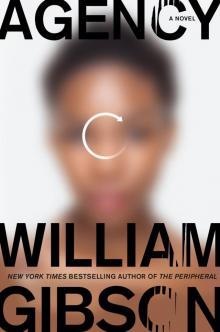 Agency
Agency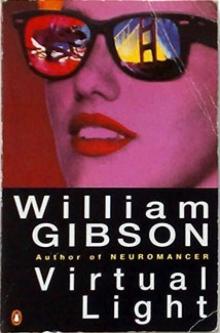 Virtual Light
Virtual Light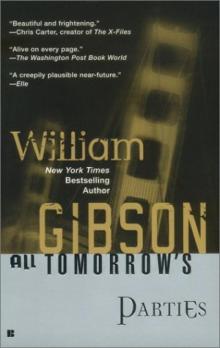 All Tomorrow's Parties
All Tomorrow's Parties The Miracle Worker
The Miracle Worker Disneyland with the Death Penalty
Disneyland with the Death Penalty Idoru tb-2
Idoru tb-2 Count Zero s-2
Count Zero s-2 The Gernsback Continuum
The Gernsback Continuum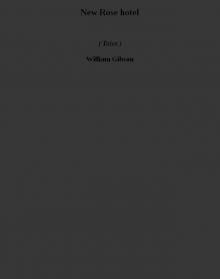 New Rose hotel (tales)
New Rose hotel (tales)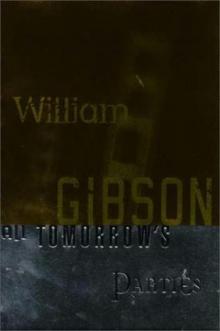 All Tomorrow's Parties bt-3
All Tomorrow's Parties bt-3 Hinterlands
Hinterlands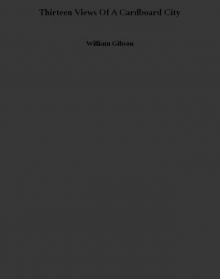 Thirteen Views Of A Cardboard City
Thirteen Views Of A Cardboard City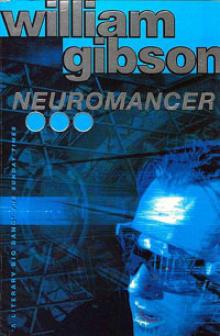 Neuromancer ts-1
Neuromancer ts-1 Virtual light b-1
Virtual light b-1